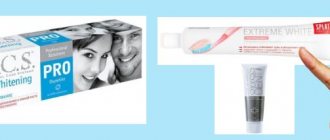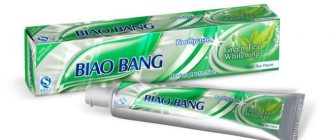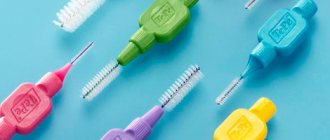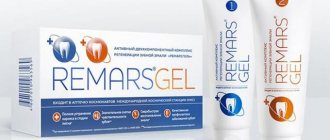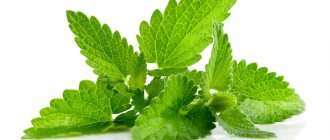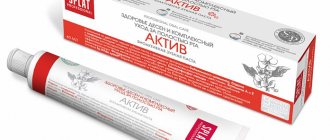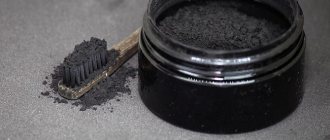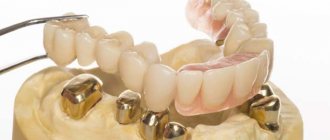Who is calcium paste recommended for?
In advanced cases, remineralizing therapy is prescribed in a clinical setting. The procedure has a good healing effect. The crowns are strengthened and the enamel layer is restored. After the session, dentists recommend using hygiene products with calcium. In addition, they are prescribed:
- With active release of mineral components and superficial caries;
- To avoid destruction of enamel;
- To stop the penetration of pathogenic microbes into dentin tissue and prevent bacterial plaque;
- If the enamel is weakly resistant to acid attack;
- When the patient has increased vulnerability of the crowns;
- If the patient has fragile units that are prone to chipping;
A simple way to strengthen crowns is to clean the chewing organs daily with pastes that have a mineralizing effect. Calcium plays a major role in the formation of bones, it maintains the integrity of incisors, fangs, molars, and prevents hyperesthesia, which appears due to thinning of the enamel.
How to choose baby toothpaste
As soon as the baby’s first tooth appears, parents should clean the mouth with special soft brushes. Children's toothpastes with calcium begin to be used at 2-2.5 years, when the child has mastered the science of mouth rinsing. It is better to use substances with a gel-like consistency. They do not contain abrasive granules and do not harm immature enamel. If problems arise with temporary units, pediatric dentists also advise using products that contain calcium.
Parents should remember that toothpastes containing fluoride are not suitable for children. This element causes side effects, especially in young children. Products for teenagers can be used after 7-8 years. Children are prohibited from using adult hygiene pastes, especially those that have a lightening effect. Such a substance as sodium bicarbonate should not be present in children's preparations. It promotes the rapid destruction of immature enamel.
How to choose pasta for an adult
During development, the chewing organs take minerals from foods. An adult's incisors, canines, and molars practically do not receive calcium from food. In order for the formed units to become stronger, they need to be saturated with calcium through the enamel. Therefore, hygiene products for adults should contain this mineral. It is important to remove dental plaque in a timely manner in a clinical setting. Studies have shown that if calcium gel or paste is applied to surface defects, they are reduced. Preparations with calcium glycerophosphate have a good effect. Before purchasing a powerful enamel restoration product, it is useful to consult a dentist.
It is difficult for the body to accept fluoride, carbonate, and gluconate. Therefore, dentists recommend preparations that contain those calcium compounds that are easily absorbed:
- glycerophosphate;
- citrate;
- pantothenate;
- lactate;
- synthetic hydroxyapatite;
Doctors do not recommend using products that contain fluorine and calcium at the same time, since their combination leads to the formation of an insoluble salt. Care with such a remedy is harmful. Active useful particles of elements will not enter solid tissues. The content of auxiliary components is important. Xylitol is beneficial. Aluminum oxide and sodium lauryl sulfate can be harmful. They disrupt metabolic processes in the body.
Rating of the best children's pastes
- Splat Baby "Apple Banana". Suitable for children up to one year old. Along with the paste itself there is a special silicone brush that fits on your finger. In production, only natural ingredients are used, which makes it absolutely safe even if swallowed.
- Babycoccole . The manufacturer produces pasta in several flavors: strawberry, banana and apple. It does not contain any substances that may be harmful to the child or allergens. It has a pleasant taste, and most importantly, it prevents the development of caries.
- Chicco with strawberry flavor . Recommended for children over one year old. Does not contain fluoride, abrasives, is rich in calcium and xylitol, which prevents the development of caries.
- ROCS Kids "Citrus Rainbow" . Suitable for children aged 4 to 7 years. Its distinctive ability is the rapid formation of a protective layer on the surface of the teeth, which prevents the loss of calcium and phosphorus. Regular use reduces the likelihood of developing caries and inflammation of the gums, and also helps to normalize the microflora of the oral cavity.
- Biorepair Junior Mint – with sweet mint flavor. Recommended for use by children aged 7 to 14 years. It contains the proprietary micro Repair component, which has a protective effect and also restores microdamage to the enamel.
Toothpaste must be safe and of high quality. It should not contain sulfates, antibacterial substances, dyes, or flavors. Should be rich in calcium and lactic enzymes. Choosing the right toothpaste will improve the quality of your child's teeth and help you avoid expenses at the dentist's office. .
ROCS Active Calcium
This calcium toothpaste tops the list. The Russian manufacturer created it to restore the enamel layer. It is based on hydroxyapatite. The substance is capable of regenerating the enamel layer. Gums are strengthened due to an element such as xylitol. It also normalizes the microflora of the oral cavity. Benefits of the hygiene product:
- Soft and gentle abrasive action;
- Dentists recommend the product to patients with increased vulnerability of crowns;
- Quick positive effect in case of damage to the upper layers of the masticatory organs;
- Prevention of the appearance of solid bacterial deposits;
- Absence of synthetic dyes;
Properties of toothpastes
When choosing a paste, it is important to pay attention to its abrasiveness, composition, consistency and taste. A properly selected paste will not only bring benefits, but will also make the cleaning process more enjoyable.
Abrasiveness
The abrasiveness of the toothpaste determines the intensity of the impact on the enamel. The degree of abrasiveness depends not only on the number of abrasive particles, but also on their size. The larger they are, the more they polish the enamel. The number and size of particles form the abrasiveness index, which is indicated on the paste packaging with the abbreviation RDA.
- If you have sensitive teeth and gums, choose low-abrasive toothpastes with an RDA of 20 to 50
. - If you don't have dental problems, moderately abrasive toothpastes with an RDA of 50 to 80
. - Pastes with RDA from 80 to 110
polish the enamel, providing a slight brightening effect. They should not be used daily. - Pastes with an RDA above 120
have an intense brightening effect. Not recommended for chipped and cracked enamel, as well as for increased tooth sensitivity. - For children under 2 years old, it is better to choose a paste with RDA 0
, from 2 years old - no more than 20.
Consistency
In addition to the composition, the thickness of the paste is also important. To ensure that the paste is evenly squeezed out of the tube and does not separate, manufacturers add thickeners and emulsifiers to the composition. They are used not only in toothpastes, but also in cosmetics, food and special gels for teeth (for example, miradent mirasensitive hap+).
Taste and smell
The paste should not only be beneficial and safe, but you should also like it. The taste and smell should not cause unpleasant sensations. Choose based on your own preferences - today pastes are made not only with the classic mint taste.
The fruity flavors of Curaprox pastes will help diversify your everyday life. They have unusual combinations: watermelon and mint, apple and aloe, blackberry and licorice.
Of the available pastes, you can experiment with SPLAT and President. At SPLAT you will find the flavors “Siberian berries”, “Raspberry”, “Strawberry” and even “Chili”. President's Limited Edition series has three vibrant flavors: Berry Smoothie, Mint Lime and Spicy Cranberry.
Brushing your teeth with Marvis toothpastes will turn into an aesthetic pleasure. They come in ginger, jasmine, cinnamon, cherry, citrus, licorice and rhubarb flavors.
Taste is especially important in children's toothpastes, because not only do children like it, but it also helps accustom the baby to the routine of daily brushing.
But it’s worth making a reservation: the pleasant taste of pasta should not be the main criterion for its selection.
President Unique
To prevent problems from occurring, you need to regularly perform professional oral and dental hygiene in a clinical setting. This is the only way to avoid gingivitis, stomatitis, periodontitis, caries, and damage to the enamel layer. After such procedures, dentists recommend that patients use hygiene products that restore and strengthen the enamel. President Unique is a product of an Italian manufacturer. In addition to papain and hydroxyapatite, it contains aloe extract, as well as vitamin E and spherulites extracted from the juice of Acacia Senegalese. These components gently and carefully clean and brighten the enamel layer of the units. Pros:
- Rapid regeneration of pathological enamel;
- Relieving inflammation, fighting bacteria;
- Prevents the accumulation of dirty plaque and hard stones;
- Beneficial effect on gum tissue;
- Improving blood circulation in the soft tissues of the oral cavity;
The product is successfully used for the treatment and prevention of the initial phase of periodontal disease.
Anti-inflammatory substances
Aluminum lactate, triclosan, chlorhexidine, biosol are names that can most often be found in descriptions of pastes that have antimicrobial and anti-inflammatory properties. The effectiveness of these elements is quite high, but it should be understood that, together with pathogenic microflora, they destroy or reduce the activity of beneficial ones. For this reason, their prolonged uncontrolled use may have a negative impact on health in the long term. Such pastes, like all therapeutic and prophylactic pastes, should be used after consultation with a dentist and according to his instructions.
Ideally, therapeutic and prophylactic pastes with additives should be used on the recommendation of a dentist, who will select the appropriate product for each specific case and tell you how and how much to use. In addition, it should be understood that such pastes are not an alternative to professional hygiene, remineralization and lamination at the dentist, but only an effective addition to these procedures.
There are contraindications, you should consult your doctor
SPLAT Biocalcium
This product is a complex product. The bioactive substance is obtained from egg shells. Hydroxyapatite, which is part of the product, is a building element for hard tissues. The enamel is strengthened due to the high content of active components. They quickly reduce the increased vulnerability of crowns. A natural enzyme such as papain minimizes the risk of accumulation of dirty plaque and bacterial stone.
Normalization of pH balance is achieved through sodium bicarbonate. The product takes care of gum tissue. It safely brightens and polishes crowns. Problems are solved by saturating the damaged areas of the units with natural calcium, especially in the initial stages. Natural enzymes promote fresh breath. A noticeable result will appear after a week of using the product.
From the history
The mention of the first means for cleaning teeth dates back to the 3rd-5th millennium BC. The ancient Egyptians ground eggshells, pumice, ashes of ox entrails, and myrrh and prepared a product from this, which was the progenitor of tooth powder. The Greeks, Romans and Persians improved the recipe by adding shellfish shells ground into powder, crushed chalk, honey, and dried plants. The Slavs contributed to the development of dentistry by starting to brush their teeth with birch charcoal. Powders and pastes, more or less similar to modern ones, appeared in Great Britain only in the 18th century, when their use was considered the prerogative of the nobility.
Modern people are luckier - everyone can choose a product to suit their taste and budget or for medical reasons. Nowadays there are toothpastes that are not only hygienic, but also therapeutic and prophylactic, which include special additives. Let's look at them in more detail.
Hollywood smile. How to whiten teeth at home? More details
Chemical substance, biochemical processes
In addition to water, natural sources of fluoride are fish, apples, and tea. fluorine acts as an inhibitor in many foods, affects the metabolism of fats and carbohydrates, and is involved in the formation of teeth and bones. But at the same time, we must not forget that the same fluorine is a chemical substance of the second hazard class. Fluoros in Greek means destroyer. Fluorine gas F2 is lethal to humans. No other element has a physiologically required amount so close to the dose that produces a toxic effect. Under the influence of excess fluoride in the body, an imbalance of phosphorus-calcium metabolism occurs, which leads to disturbances in the mineralization of bone tissue and ligaments.
Colloid degeneration of thyroid tissue
Scientists - fluorine causes colloidal degeneration of thyroid tissue, reduces immunity, inhibits intracellular synthesis processes and accelerates physiological aging. According to a study published in the journal Behavioral Brain Research, fluoride can cause changes in brain tissue similar to Alzheimer's disease and some other forms of dementia. And to continue this sad list... have you ever seen warning notices hanging in pharmacies or stores selling fluoride-containing toothpaste?
If fluoride can really help our teeth, then only in microdoses. It is desirable that this element enters our body exactly in the quantity in which we are able to absorb fish, apples, tea and mineral water.
Fluoride toothpaste? By the way, about water. Even if you prefer tap water to mineral water, do not think that you can safely use fluoride toothpastes. In the sixties, many other countries followed America's example; the side effects of water fluoridation were discovered; most of these countries abandoned such experiments on their citizens. In Germany, fluoridation of water is expressly prohibited, since it is the same as prescribing the same medicine to everyone and forcing them to take it, regardless of the possible consequences. We can say that water is now fluoridated only in America and Ireland. But even there there are fighters against forced fluoridation of the population.
Dentists simply do not know how dangerous water fluoridation is. They do not know that the fluoride used for this is obtained from toxic waste containing lead and arsenic. Mac Auley claims that the truth is being hidden from the Irish; there has never been any research done into the effects of drinking fluoridated water. As for Russia, we have both territories with a naturally low fluorine content in water, and regions where the amount of fluorine exceeds the norm; water fluoridation is considered a benefit, as a promising direction of development, and this technology is being implemented everywhere. At least in those regions where there is money for this.
Fluoride compounds, food additives, fluoride tablets
The population knows nothing about such concern from the local government. And people buy toothpaste without knowing what kind of water flows from their taps. So, the eternal Russian question: what to do? Unbiased dentists answer this question as follows: The emergence, in addition to water fluoridation, of other sources of fluoride compounds, such as food additives, fluoride tablets or toothpastes, may mean that changes are necessary in the overall picture of fluoridation, which will require additional research, regulation of the supply of fluoride-containing pastes to regions with a high fluoride content in the diet of the local population. That is, research has yet to be carried out, and supplies have yet to be regulated by the grazing of drowning people - the work of the drowning people themselves. Think with your head, change the paste more often, do not use the same paste morning and evening, and carefully read what is written on the tubes in the smallest letters.


